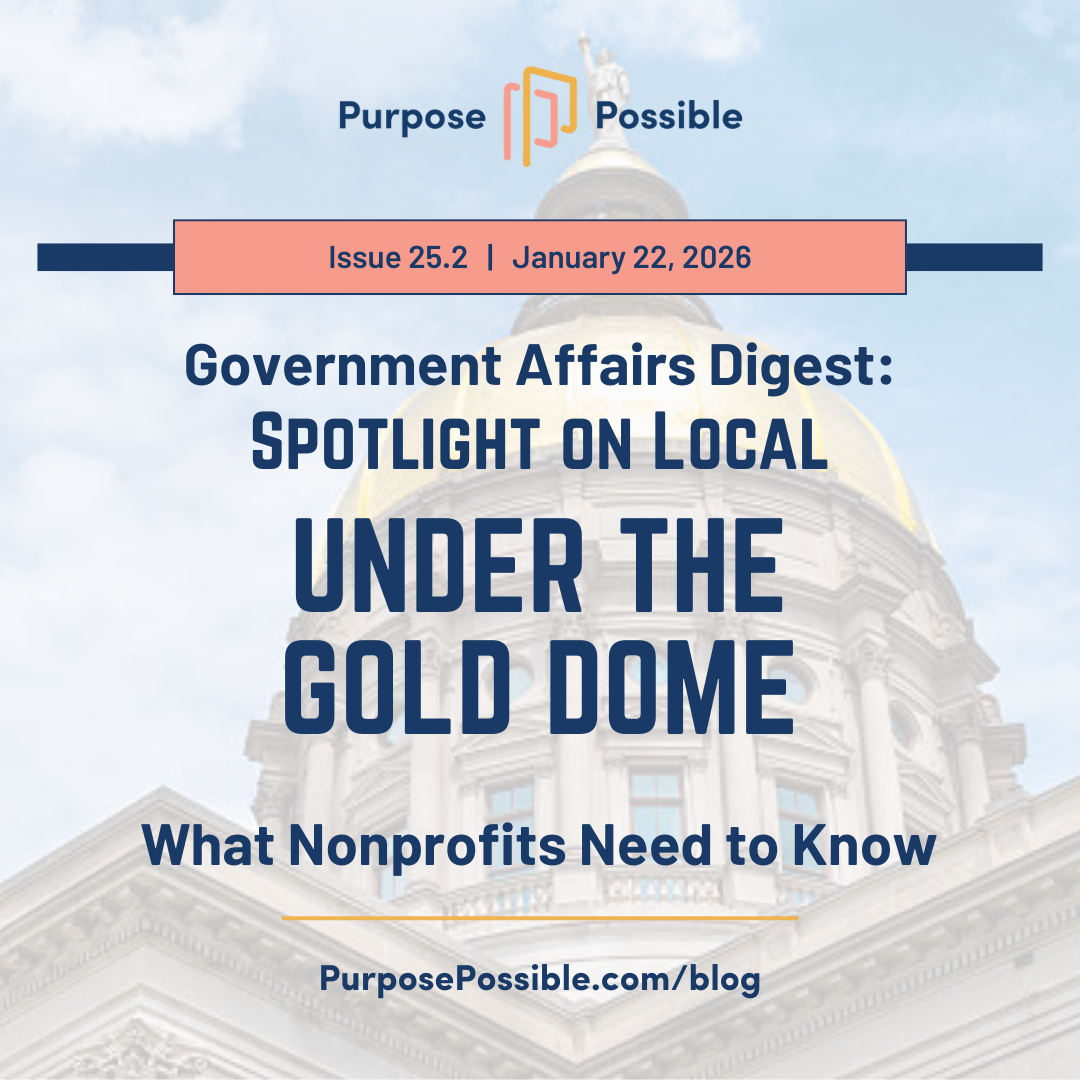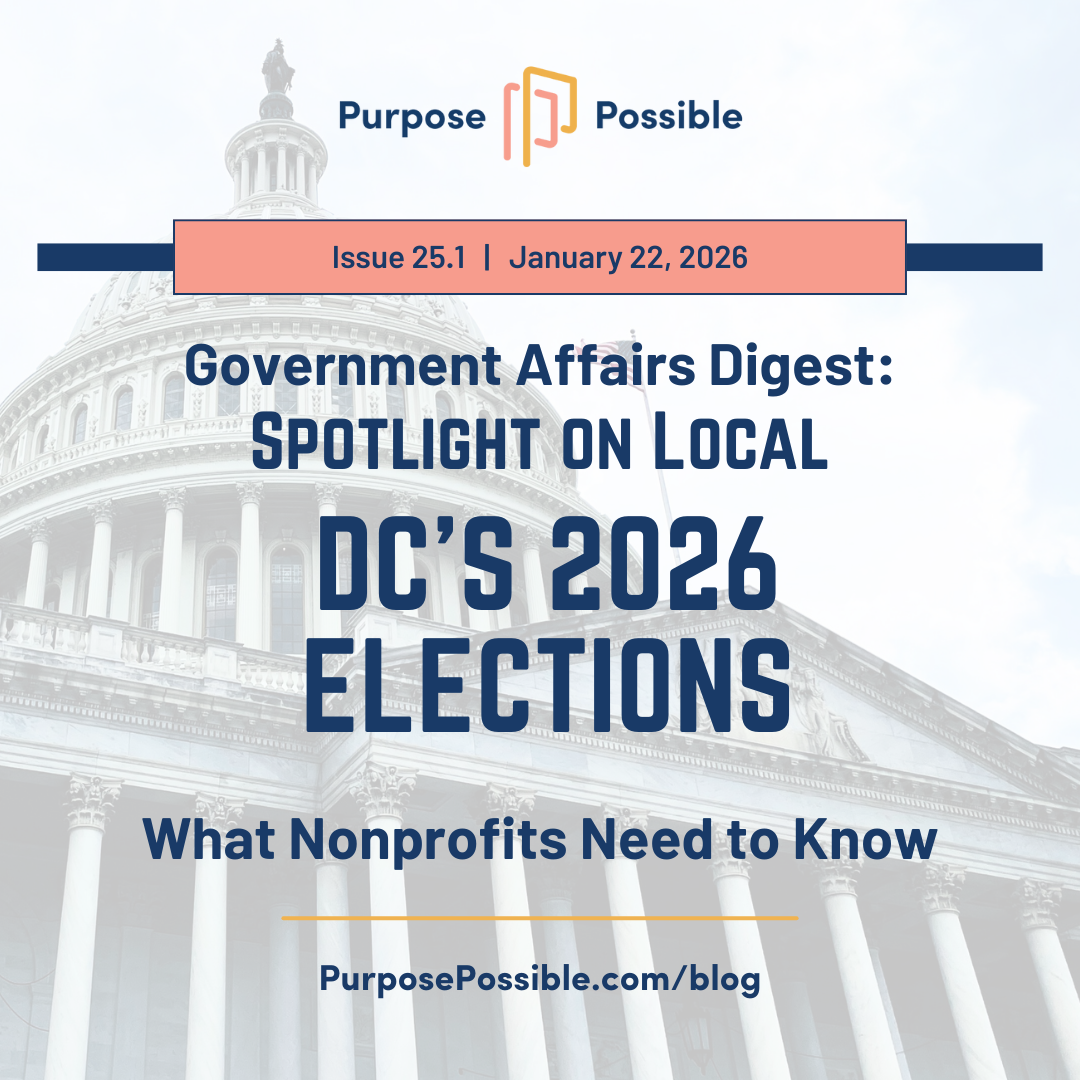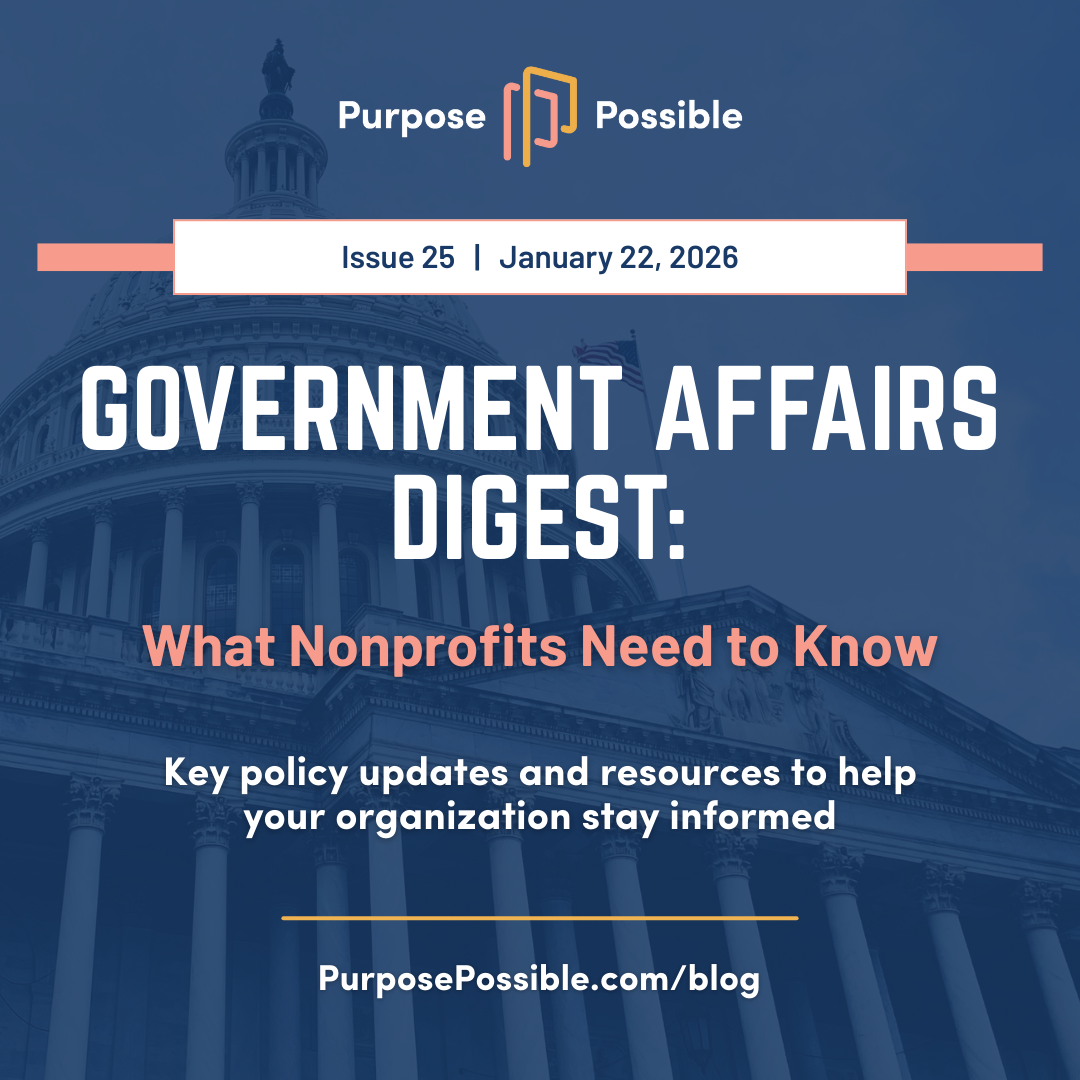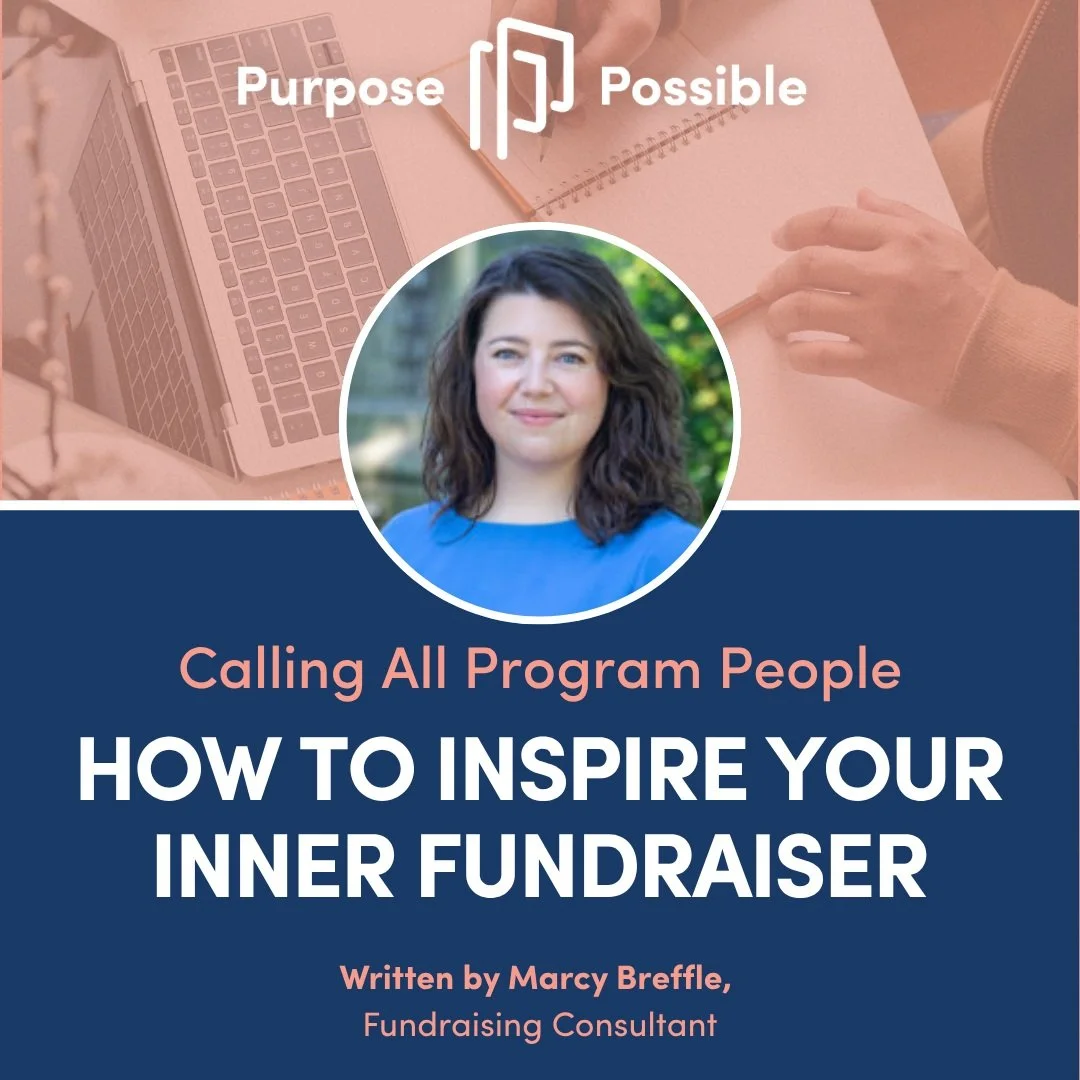
Gov. Affairs | Issue 25.2 | January 22, 2026
A closer look at the importance of local decisions that will directly shape the resources and stability available to Georgians as the second year of the biennial 2025 - 2026 Legislative Session kicks off. This special edition highlights key issues to keep and eye on and offers resources to keep nonprofit leaders up to date as they plan for 2026 and beyond.

Gov. Affairs | Issue 25.1 | January 22, 2026
A closer look at the importance of local elections and decisions that will directly shape the resources and stability available to communities in D.C.. This special edition offers recommendations and presents key dynamics nonprofit leaders in D.C. should be tracking as they plan for 2026 and beyond.

Gov. Affairs | Issue 25 | January 22, 2026
The latest updates on the current TANF funding freeze, the SAMHSA funding reversal, and an overview of the ongoing legal challenges posing a threat to the free press. The digest also offers some good news out of Atlanta as well as resources.
Be sure to check out the two special editions of the digest this week in Spotlight on Local for an in depth look at D.C. and Georgia where local elections and decisions will shape the funding landscape for many of our clients.

Gov. Affairs | Issue 24 | December 18, 2025
A closer look at the latest updates on the case challenging the Johnson Amendment, an overview of the ins and outs of Trump Accounts, and a bit of good news about a new bipartisan Philanthropy Caucus taking shape in Congress.

Gov. Affairs | Issue 23 | November 20, 2025
The latest updates on the aftermath of a 43 day Government shutdown, the restoration of SNAP benefits, and a lawsuit against the Trump administration’s new regulations around Public Service Loan Forgiveness eligibility.
The digest also delivers readings, resources and a bit of good news.

Gov. Affairs | Issue 22 | October 30, 2025
The ongoing federal government shutdown has brought the reality of food insecurity into sharp focus, threatening the immediate halt of Supplemental Nutrition Assistance Program (SNAP) benefits for over 42 million Americans.
The food crisis requires a massive, coordinated effort from non-profits, local businesses, and community members. This guide organizes essential resources and news coverage to help you/your community find assistance, understand the greater political context, and learn how to support local efforts.

Using GivingTuesday to Drive Year-End Results
Think of GivingTuesday as one key piece of your end of year fundraising pie. If your campaign runs only in December, GivingTuesday is the perfect launch pad. If you begin earlier, use the day to create extra momentum and visibility without letting it take over your entire strategy.

Gov. Affairs | Issue 21 | October 16, 2025
The latest updates amidst a Government shutdown include the termination of all Community Development Financial Institution (CDFI) Fund Staff, the DOJ pushes US attorneys to probe Open Society Foundations, an Executive Order designating Antifa as a domestic terrorist organization, and a federal court rules in favor of artists in the case against the NEA.
The digest also delivers readings, resources and a special update on EFSP Funding.

Gov. Affairs | Issue 20 | September 30, 2025
A government shutdown places significant strain on nonprofit organizations, which are often called upon to serve as a safety net for communities during crises. Nonprofits that rely on federal contracts and grants face an immediate cash flow crisis, as funding reimbursements and new grant awards can be frozen or delayed due to the furlough of agency personnel. This funding interruption forces many organizations, which typically operate with small cash reserves, to either use emergency funds, lay off employees, or pause critical services.
This is an evolving situation and we will continue to monitor and report out as appropriate.

Investing in Our Community: A Call to Action for a New Era of Giving
While the legislation may be intended to generate tax revenue, it presents a significant challenge to the vital work of nonprofits in Atlanta and across Georgia.

Gov. Affairs | Issue 19 | September 18, 2025
Updates on the successful continuation of the Combined Federal Campaign (CFC) after action and advocacy by leading nonprofits, a new lawsuit challenges HUD restrictions on federal housing funding set forth to exclude applicants in jurisdictions with sanctuary protections, harm reduction services, or transgender-inclusive policies, and more information on the Department of Education’s proposed overhaul of the Public Service Loan Forgiveness (PSLF) program.
The digest also delivers additional readings, resources and actions to take.

Gov. Affairs | Issue 18 | August 20, 2025
Updates on a federal judge’s ruling to scrap the Trump administration’s guidance against DEI programs at schools and a temporary block on the administration’s attempts to limit domestic violence grants. Plus details on two executive orders, one to give politicians control over all federal grants and another eliminating the “housing first” template to address homelessness.
The digest also delivers additional readings and resources.

2025 Purpose of Giving: Insights and Takeaways
On August 13, Purpose Possible and nearly 200 mission-driven professionals gathered and tuned in for The Purpose of Giving: Insights from Giving USA. Here are key highlights, actionable takeaways, and linked resources for organizations, professionals, and community builders looking to harness these insights and data.

Gov. Affairs | Issue 17 | July 17, 2025
Updates on the passing of the rescissions package in both the House and Senate which will cut previously approved funds for global health, humanitarian aid and public media among others. Plus impacts of the One Big Beautiful Bill on non-profits and information on the status of the Johnson Amendment.
The digest also details local updates out of Georgia and DC and offers some good news, readings and resources.

How to Inspire Your Inner Fundraiser
“Everyone is a fundraiser.” This phrase can strike fear into the hearts of non-development staff, conjuring up images of standing on a gala stage before a room full of major donors. Dear program people, let me assuage your fears - you will almost never be asked to make the “big ask.” However, every staff member does have a role to play in their organization’s fundraising efforts.

What We Learned from the 2025 Giving USA Report
The 70th annual Giving USA Report, the most comprehensive look at charitable giving in the U.S., revealed how Americans gave in 2024.

Gov. Affairs | Issue 16 | June 18, 2025
Updates on the “One Big Beautiful Bill” including key tax implications for non-profits and proposed cuts to safety net programs, plus a recession package that threatens over $9.4 billion in funding, and a court ruling on the illegal termination of NIH research grants.
Plus a few snippets of good news, additional readings and resources, and important actions to take to have your voice heard by legislators.

Staying Connected with Funders
Funders view grantees as trusted partners, which is why building and maintaining strong relationships is critical. Ongoing engagement with funders ensures your organization stays top of mind and demonstrates your value as a trusted partner.

Gov. Affairs | Issue 15 | May 14, 2025
Updates on the Executive Order to end federal funding for NPR and PBS, plans to eliminate the NEA, NEH and IMLS, and upcoming tax laws that could increase taxes on investment income for endowments and strip non-profit status from organizations the administration deems to be “terrorist supporting”.
Plus additional good news, readings, resources, and important actions to take to have your voice heard by Congress.

Webinar: The First 100 Days & Beyond
The first 100 days of the new administration brought sweeping changes that immediately began reshaping the nonprofit sector. From executive orders and staffing shifts to agency closures and budgetary uncertainty, organizations have been on high alert questioning what to do and what’s coming next. After publishing 14 weekly Government Affairs Digests, Purpose Possible hosted a live webinar, The First 100 Days & Beyond.
